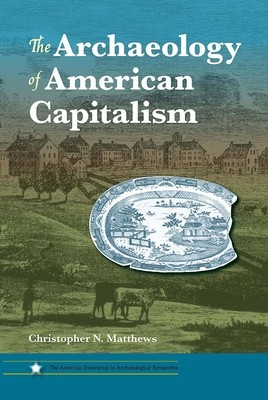
- We will send in 10–14 business days.
- Author: Christopher N Matthews
- Publisher: University Press of Florida
- ISBN-10: 0813044162
- ISBN-13: 9780813044163
- Format: 15.2 x 22.9 x 1.6 cm, softcover
- Language: English
- SAVE -10% with code: EXTRA
Reviews
Description
Christopher Matthews offers a fresh look at the historic material culture and social meaning of capitalism in this wide-ranging and compelling study. Drawing on archaeological evidence from the colonial period to the modern era and covering sites from New England to California, The Archaeology of American Capitalism is the first comparative treatment in historical archaeology to comprehensively illustrate the development and evolution of capitalism in the United States.
Accessible to even the beginning student and organized chronologically, this volume focuses on the material construction of individuals as commodities, the orientation of social life to the market, and grassroots resistance to capitalist culture. Perhaps most intriguing, Matthews identifies the discipline of archaeology as an artifact of capitalism and offers a thoughtful investigation into the ways in which the transformative effects of capitalism determine not only much of the archaeological record, but the pursuit of archaeology itself.
EXTRA 10 % discount with code: EXTRA
The promotion ends in 17d.16:10:46
The discount code is valid when purchasing from 10 €. Discounts do not stack.
- Author: Christopher N Matthews
- Publisher: University Press of Florida
- ISBN-10: 0813044162
- ISBN-13: 9780813044163
- Format: 15.2 x 22.9 x 1.6 cm, softcover
- Language: English English
Christopher Matthews offers a fresh look at the historic material culture and social meaning of capitalism in this wide-ranging and compelling study. Drawing on archaeological evidence from the colonial period to the modern era and covering sites from New England to California, The Archaeology of American Capitalism is the first comparative treatment in historical archaeology to comprehensively illustrate the development and evolution of capitalism in the United States.
Accessible to even the beginning student and organized chronologically, this volume focuses on the material construction of individuals as commodities, the orientation of social life to the market, and grassroots resistance to capitalist culture. Perhaps most intriguing, Matthews identifies the discipline of archaeology as an artifact of capitalism and offers a thoughtful investigation into the ways in which the transformative effects of capitalism determine not only much of the archaeological record, but the pursuit of archaeology itself.


Reviews